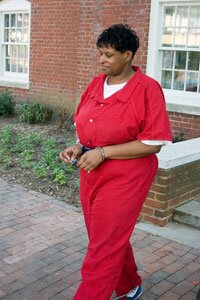NEWS- Oops again: 'Clerical error' keeps another in jail

Jennifer White spent an unnecessary month in jail.
PHOTO BY WILL WALKER

Charlottesville clerk Paul Garrett says he tries to get paperwork done as quickly as possible.
PHOTO BY JEN FARIELLO
Just as Charlottesville legal types were catching their breath from a round of finger pointing over a woman kept in jail more than a month after a grand jury failed to indict her, a second emergency hearing was held last week to release a man who should have gotten out two days earlier.
John Milton Brown should have been released September 26, but he was still sitting behind bars September 28, according to deputy public defender Liz Murtagh. "The paperwork was done incorrectly," she says. "It was a clerical error."
The latest snafu comes just days after the public defender's office began blaming Circuit Court Clerk Paul Garrett of failing to provide the public documents that would have freed Jennifer Dowell White on August 20– instead of the date she finally emerged from jail, September 25.
Commonwealth's Attorney Dave Chapman eventually joined the fray by defending Garrett and suggesting that the public defender's office should hang out in court if it wanted to know the results of secret grand jury proceedings.
"Where were they?" says Chapman. "Why wasn't someone there from the public defender's office?" (He adds that in his notes from that session, he has nothing about the grand jury not indicting White.) But defender Jim Hingeely fires back.
"No criminal defense lawyer who has a client who may be indicted attends the reporting of the grand jury at the end of the day," says Hingeley. "That just is not done. The reason is, we rely on the written public record."
And, notes Hingeley, "You know who was there? Dave Chapman and Paul Garrett, and neither of them picked this up. To me it sounds like their prescription isn't a solution."
When the grand jury returns with its indictments, the procedure is open to the public, and Chapman says he or someone from his office is there to note which cases are not true bills of indictment, as was the case with White.
"There are a number of opportunities for them to get accurate information easily," contends Chapman. "I think a hardworking public officer is being unfairly criticized in an opportunistic way."
"We made numerous requests to Paul Garrett and got no response," counters Hingeley, who says that the day his office found out White had not been indicted he and White's attorney, Valerie L'Herrou, went to the clerk's office.
"I saw Paul didn't know where it was," says Hingeley. "It took him 20 minutes [to find it]. Are we being unfairly critical to Paul for not making indictments public to defense lawyers and the media?"
In Albemarle, Hingeley adds, attorneys can get copies of indictments the day after the grand jury meets.
"I can't put my finger on every particular file," says Garrett. "I told Jim I remembered it was not a true bill. When we looked through the drawer, we overlooked it."
Garrett notes that the August 20 docket call was extremely large, and that the person who usually handles indictments in his office is on medical leave. "That's not an excuse, but a reason," says Garrett, who's been clerk of court in Charlottesville since 1981 and elected to his fourth eight-year term in 2003.
Hingeley says his staff just wants to be able to see the indictments and make copies. "That's not an added burden on the clerk. I don't think it's asking too much of the clerk to know where indictments are filed."
He points to a recent recommendation from the Virginia Supreme Court to improve the efficiency of court administration by eliminating the constitutional office of clerk of the circuit court, with each court instead appointing an administrator.
"This would put a professional court administrator, accountable to the Virginia Supreme Court, in place of elected clerks like Paul Garrett, who are accountable only once every eight years to local voters who quite often know little about how the clerk's office is run," he says.
Meanwhile, Jennifer White, the woman who spent an extra month in jail, still claims to have hard time understanding why. She was charged with obtaining money under false pretenses for a bridal expo that was supposed to take place in January.
She insists it was a legitimate business that was canceled because enough vendors didn't sign up. "The Paramount does it every day," she says. Only three people didn't get their money back, according to White. [The Hook is among White's creditors.]
White admits she's been a convicted felon since 1997. "Once a con, always a con," is how White says she's treated. She says that the most recent charges are normally a civil matter, and the grand jury's failure to indict her backs up her contention that she didn't intend to defraud anyone.
Her lengthy improper stint in jail caused her other problems, including two warrants for probation violation, she says. She headed back to jail September 29.
As for John Milton Brown, the man who got a couple of extra days in jail because of a clerical error, Garrett says the magistrate used the wrong number. And Garrett declines to respond to the heat he's taken over the past week that includes an editorial criticizing him in the September 30 Daily Progress, which calls the error that kept White in jail "egregious."
"I'm not going to cast aspersions on any other office," says Garrett. "We're using the system that's been in place since I first took office that's always worked up until now."
#